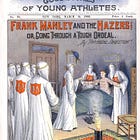Welcome to Part Five of Bama Confidential, a week-long series that goes deep into the past and present of Greek Life at the University of Alabama. If you missed Part One — on sorority rush — or just want to read the intro to the series, and how it found its way to Culture Study, you can find it here. You can read Part Two, on The Machine, here; Part Three, on how the Greek System stayed segregated until 2013, here; and Part Four, on How Hazing Endures Behind Fraternity Doors, here. If you want to explore the content coming out of #Rushtok this week, I’m curating it over on my Instagram (and make sure and check the pinned stories). Regular Culture Study Readers: This series will arrive in your inbox every morning this week. If it’s not your thing, don’t worry, we’ll be back to regular Culture Study programming next Sunday. If you’re not a Culture Study subscriber but want to become one — or show your gratitude for this reporting — sign-up below. Back in the fall of 2015, Alex Smith was a sophomore of Phi Mu, one of the prestigious “old row” sororities. Alex didn’t know exactly where she wanted to end up at the end of college, just that it would be far away from how she grew up: in a double-wide trailer in a tiny town in Northern Alabama. She had the sorority. She had the grades. She was a Crimsonette — a baton twirler at football games — another source of major Bama social capital. And she’d recently started her term as an SGA senator. As Alex recalled, “it all just seemed like it was falling into place perfectly.”
Then she got a text from an upperclassman in another sorority — someone she barely knew. There was going to be some kind of SGA meeting later that week, the upperclassman said, and Alex needed to be there. The whole thing was weirdly vague. All she knew was that the meeting would be at night, and the other girl was going to drive her there. Alex remembers asking, “Do I need to dress up?” Nope, the standard 2010s college uniform of an oversized T-shirt and Nike shorts were just fine. The night of the meeting, the other girl picked up Alex and they drove together to the Kappa Alpha (KA) fraternity house. It was about 10pm, an odd time to be at the fraternity house on a weeknight, let alone having meetings. They parked at KA house, not far from the Civil War-era cannon that sits out front (KA, you’ll recall, is that fraternity that hosted the “Old South Ball”) and made their way to the basement entrance. When Alex reached the bottom of the stairs, she saw about a dozen people mingling. Some faces she recognized; most she didn’t. Alex was still clueless as to why she was there. “This situation looks harmless,” Alex recalls thinking, “but… I'm feeling uneasy.” Then a guy she didn’t know moved to get everyone’s attention. He announced: “I wanted to call this special meeting tonight to inform you all that you are now part of a select secret group of senators,” he said. “Take a look around, get to know each other's faces. Don't tell anyone about this meeting. These are your fellow Machine senators. You're going to get to know each other.” Then the guy leading the meeting announced that he was going to run for Speaker of the Senate. He pointed to another girl and announced she was going to run for Secretary of the Senate. All attendees were told they needed to support these candidates, and that they needed to get their respective sorority and fraternity houses to do the same. No discussions, just directives. Hearing Alex tell this story was thrilling. At this point in the reporting process, I’d managed to get a play-by-play of the inner-workings of a Machine meeting — something John and Alecia Archibald, the dedicated, would-be Machine-busting reporters from the 1980s, would have killed to get. What struck me immediately, hearing Alex’s story, was just how guarded and mysterious everything was — even for those on the inside.
No one had asked Alex whether she wanted to be part of The Machine. It was just a given: she would go along and do what she was told. Which was especially awkward for Alex since one of her good friends — someone very much not in that dingy basement — was already planning to run for Secretary of the Senate. Now Alex was being instructed to organize votes against her, with no information about why this other person in the room, a stranger, wanted the position, or what she planned to do when elected. What weren’t they telling her? ● For all the hushed whispers about the Machine, there is at least one person who openly embraced it: Jared Hunter, the first Black Machine-backed SGA president. We went in depth on his campaign earlier this week, but we didn’t mention the unusual move he made during it. He published an open letter in the Crimson White, openly acknowledging that he had the Machine’s support and backing. “Running for office with the support of a group with such a checkered past was one of the hardest decisions I have ever made,” he wrote. Jared saw the acknowledgment as a way to build more transparency into the system: yes, he had the backing of the Machine, but he promised to represent all students. “Not only does the Greek community not fully define our campus,” he wrote, “it does not fully define myself as an individual.” It was a bold move, and I’m guessing it raised eyebrows among some Machine members — remember, this was the group that had allegedly stolen an entire run of that same newspaper to prevent its members from being publicly named, and which refused to even publicly acknowledge its own existence.
Jared knew he was walking a fine line. In fact, he was almost thrown out of the election on the technicality that “political parties” are not allowed in SGA. (The regulatory board that oversees SGA elections sent Jared emails citing campaign violations, but those violations hinged on the university acknowledging the existence of the Machine — which, again, it refused to do.) Still, Jared was confident in the move. He thought he could sell the Machine on an era of (relative) transparency, positioning it as a softer, kinder secret society. They were just an interest group! With a Black candidate! And when you hear Jared talk about his experience with the Machine, it does feel like “special interest group” is the better descriptor. After he won, he was pleasantly surprised by how much freedom he had in the position. There was no council of elders controlling his moves. “When we were staffing the executive cabinet,” Jared recalled, “we were able to offer a lot more positions to Black and Brown people versus just people that…wanted something for their resume.” He also supported the creation of a new sexual assault resource center in Tuscaloosa. Jared didn’t have to run any of his appointees by the Machine. But that’s not because the Machine was more open-minded than he’d expected. It’s because the Machine, he quickly found out… kind of doesn’t care. Which reminds me of Alex’s experience, in that basement, being told to vote for people with no further reasoning. It feels like something nefarious is going on — I mean, this is an organization that insists on meeting in basements late at night and dedicates so much energy to controlling the SGA. But as you keep digging, you begin to realize: there’s no secret agenda. The agenda is just…winning. In Jared’s experience, all the Machine really wanted from him was two things. The first: Greek Life’s continued dominance of campus life. So long as none of his actions eroded that control, he was fine. And the other big thing they cared about? Football tickets. UA has one of the most popular college football programs in the country. According to Nielsen TV ratings, during last year’s season, Alabama was the most viewed team in all of college football. Bryant-Denny Stadium is enormous – the official capacity is 101,821 – and some sections are obviously better for watching the game than others. And what the Machine wanted almost more than anything else was for its fraternities and sororities to get good spots in the student seating section. The way Jared tells it — nearly a decade out — it all seems pretty ridiculous. So much cloak and dagger intrigue for better seating at the football game. But that was just Jared’s experience. Though Elizabeth Prophet had a very different one. ● On the surface, Elizabeth Prophet fits the Bama Sorority Mold. She’s got the long blonde hair, the big eyes, the meticulous makeup. Her sister, her Grandmother, and her Great Aunt were all members of Alpha Chi Omega (AXO), one of the most prestigious sororities on campus — which wasn’t a guarantee she’d get in, but a very, very solid bonus. The sisterhood was hers for the taking, as long as she didn’t totally mess up. But something happened during Rush that made her question whether joining AXO was the right call.
Elizabeth was sitting on her bed in her dorm room, talking with two of her friends when someone casually dropped a reference to “The Machine” into the conversation. “What are you talking about?” she asked her friends. Elizabeth has always thought of herself as having pretty liberal politics, but she grew up in a conservative town — which gave her a real “be the change you want to see” attitude. So as her friends described “The Machine” in vague, ominous tones, her mind was already anxiously turning over her options.
She was spiraling, but not so much that it torpedoed her Rush experience. She got a bid from AXO and accepted — and then spent a year thinking about how to handle Machine influence. Her response was unconventional. AXO is a Machine sorority, and so Elizabeth decided to run for the senate — as an independent candidate, without Machine-backing. Which meant that she’d be going against a Machine-approved candidate. She also decided not to tell her sorority sisters about her decision ahead of time: if they don’t know, she figured, they can’t dissuade her from running. The way Elizabeth explains it, when the Machine found out, it was not happy. She received a violation complaint against her campaign. “Someone had photoshopped a picture of my campaign manager illegally campaigning for me in a class GroupMe,” she recalled. “We reached out to the person [who’d submitted the complaint] and they said, ‘Hey, I'm not sure what this is about, but I did not submit any sort of violation.’” Elizabeth said she found the whole thing strange. She knew that violations like these were intended to force her out of the race. “Once you receive a certain number of points from campaign violations, you're subject to disqualification,” she said. Elizabeth won her seat as an independent senator, and introduced a bill that would’ve ensured that student ambassadors who give campus tours got paid for their work. Seems pretty uncontroversial, right? No one spoke out against the bill as it worked its way through the system; no one raised any concerns. But when it came time for the vote, Elizabeth recalled, “it was just a resounding no.” Elizabeth has no doubt what happened: she believes the Machine had blocked it. Simply because she, Elizabeth, was behind it. It seemed to be retaliation for running as an independent. And it happened over and over again. She was effectively blocked from being able to do anything. “It felt very helpless,” she said. Which is why Elizabeth decided to run for a new position in SGA: Executive Vice President, a position with much more power. She knew it would be a difficult race. The biggest issue that independent candidates like her face is voter turnout. In the last five years at Bama, only about 28% of the student body voted in the campus elections. That number is almost exactly the same as the percentage of students in Greek Life — which isn’t surprising since they’re, uh, strongly encouraged to vote by their Machine reps. Of course, Greek students overwhelmingly vote for Machine-backed candidates, which creates a huge problem in the rest of the study body: voter apathy. “They don't care,” Elizabeth said. “They think that the Machine is just gonna win again.” And they’re probably right. But this attitude also becomes self-fulfilling. Which is why Elizabeth’s campaign when running for SGA Executive Vice President was all about “choice”: her or the status quo. Again, her campaign was investigated for no fewer than ten violations, but she felt that her message was resonating. Perhaps, she hoped, she could actually get non-Machine students out to vote, and re-invest them in the process. But when the final tally came in, Elizabeth lost in a landslide — earning just over 31% of the vote. She was already a junior, running for a position she’d hold her senior year, so this election was her last chance at student government. Which also meant she had nothing to lose when she decided to write an editorial for The Crimson White. “You can be a member of the Greek community and still believe that the Machine is inherently flawed and systematically unjust,” she wrote. “You can love your sorority and still decide to forge your own path without permission or backing from the Machine… Will you choose to remain silent and reap its benefits? Or will you use the platforms you have to dismantle it in every possible way?” Meanwhile, the student who ran for President that same year – and won – denied he’d ever heard of The Machine. “I’m not very familiar with any organization under that name,” he told The Crimson White. While it’s difficult to verify if that student was actually backed by the Machine, he was a member of Phi Gamma Delta, which is believed to be machine-affiliated. As for Alex Smith, she eventually ran afoul of the Machine, too. She says she’d been told by Machine members she would never have to vote against her conscience — which was sort of true, so long as her conscience aligned exactly with the Machine party line. She was, in fact, told explicitly how to vote on certain issues, like who to vote against for a chief of staff appointment. And she was chastised for supporting legislation the Machine opposed, including things she viewed as low stakes, like legislation put forth by an independent senator to improve student morale. Even working with friends in the Senate who weren’t Machine members got her in trouble. The other Machine senators started ignoring her completely. Her sorority sisters started acting weird and cold. She ate lunch by herself. She got a phone call from a blocked number, and when she picked it up, the person on the other end just called her bitch. None of it seemed worth it. “I wanted to be one of the people in charge,” Alex said. “I wanted to be planning, and organizing, and leading, and I didn't realize what all came with that, the strings that were attached.” The Machine, she said, was testing her integrity. So she quit the senate, and then worked up the same courage that Elizabeth would later find: she wrote a piece for the Crimson White. But unlike Elizabeth, she didn’t try and rally the student body against The Machine. She was too tired. “I don’t need a revolution,” she wrote. “I’m finally doing the right thing. I’m finally free.” It wasn’t much. But for Alex, it was enough. Alex had always intended to stay in Alabama after graduating: go to law school, then transition into state politics. But classmates started telling her there was no way she’d get into UA Law. Some even told her that the Machine would ensure that she’d never get admitted to the bar. Which is probably (hopefully) an exaggeration, but she didn’t want to fuck around and find out. “I felt like I needed a clean slate,” she said. “I needed to go somewhere where I wasn’t going to be defined by something I did years ago.” She opted for a law school a few states away, far from Tuscaloosa. And at least for now, Alex has no plans to return to Alabama.
Even Jared, who’d actually had a relatively positive experience on campus, never even finished out his year as SGA president. He was already thoroughly disillusioned with student politics when, in the winter of 2018, he got a DUI driving back from a Taco Bell run. The Machine was clear that they still supported him as president. But at that point, he had a clear understanding of how the Machine worked — and to what end. Retaining his position would mean enduring even more scrutiny over the charge. And for what? So he could get people football tickets? Jared, Elizabeth, Alex were all smart, ambitious students who entered the University of Alabama with dreams of careers in politics. They became entangled, in various ways, with The Machine — and then left Bama with no interest in politics at all, in part because of the pettiness and hollowness of it all. “I still haven't been able to figure it out,” says Elizabeth, about what the Machine really wants. “All this time that I've spent in SGA,” she mused, “and as far as I can tell, they just seem to want these positions held so that nobody can challenge the status quo that is the Machine.” Which is exactly how it seemed to Alex, who was told just to vote for people despite them having no real ideas or agenda. But of course, there’s also the football tickets. “I feel like there has to be more to it,” Elizabeth replied. “Right?”
There is, I think. And here’s my theory: The Machine and its influence waxes and wanes in cycles. It exists to support Greek Life’s interests, so when Greek Life is under threat, it gets active. In the late 1960s and early 70s, fraternity and sorority enrollment nationwide fell sharply. Blame it on the counter-culture, blame it on institutional crackdowns, blame it on feminism or refusals to take part in such glaringly white institutions….for whatever reason, Greek Life’s hold on campus culture was loosening. Cue: the most active and violent period in The Machine’s modern history. Right now, Greek Life seems to be thriving at UA. Since 2000, the percentage of Bama students in fraternities and sororities has nearly doubled — in part due to the influx of out-of-state students in search of a “traditional” college experience (e.g., one where they get to “act like campus royalty”). The Machine has nothing to worry about, so it's gone relatively dormant, like a well-fed bear. But bears don’t hibernate forever — and when they wake up, they wake up mad. ● “Today's college leaders are tomorrow's presidents and US representatives,” Elizabeth says. “Especially in Alabama, [college] is the breeding ground for people who go on to be your local and state elected politicians.” Put differently, at UA, you learn a very specific way that power is accumulated and wielded. Namely: through The Machine. The Machine-to-wider-Alabama-politics pipeline was laid in the very early years of the Machine. J. Lister Hill, born in 1894, is believed to be one of the founding members of UA’s chapter of Theta Nu Epsilon (which became known as The Machine). He also helped start the SGA at UA and served as its first president. He then went on to become one of Alabama's US Senators, and was a vocal dissenter of the Brown v. Board of Education decision. But Hill was just the first of many to reportedly make the jump from Bama SGA to the political big time. Current US Senator for Alabama Katie Britt, Britt’s predecessor in the US Senate Richard Shelby, former Alabama Governor Don Siegelman, the late federal judge Robert Vance, and the late US Supreme Court Justice Hugo Black all allegedly went through the Machine-to-politics pipeline. Oh, and another name: Joe Espy, lawyer to a former Alabama Governor, and also a former UA trustee. Today, recent Machine-backed SGA members are reportedly connected at the White House, in US congress, in the Alabama state house, and on the Tuscaloosa City Council. In case you think I’m making too much of this pipeline — like this is all a coincidence, and perhaps not even a surprisingly one — consider the 2013 Tuscaloosa School Board election. On election day, vans, stretch limos, and at least one party bus were spotted on Sorority Row, ferrying students to the polls — for a Tuscaloosa school board election! A bar downtown had an open tab for students in Greek Life with “I Voted” stickers. When the results rolled in, the winner was a guy – just 26 years old – who’d recently graduated from Bama. When he was a student, he’d run for SGA president. He was, of course, backed by the Machine, and won. (The incumbent school board rep, a lawyer who’d been on the board for four years, uncovered emails from sororities to students offering the bar tab as a reward for voting. She took legal action, alleging interference, but was unsuccessful. Three years into the dispute, a judge dismissed the case. Her opponent denied condoning or knowing first hand of any illegitimate activities around the voters' process.) This is exactly the kind of power apparatus Jared Hunter was trying to tap into when he approached The Machine — and what he turned from when he stepped down as SGA president. Because there was another layer to that decision, one that he knew would ultimately hold him back, Machine-backing or not. He couldn’t hide the fact that he was Black, and he chose not to hide the fact that he had Machine affiliation. But that doesn’t mean he was living as his true, authentic self. Because Jared was gay, and he knew he had to remain in the closet — not just throughout his time at Bama, but afterwards. “Maybe I could be a senator from Alabama,” he told me, “But I could not be a gay Black senator from Alabama.” When he let go of that goal, he decided that persevering with SGA simply wasn’t worth it. But he wasn’t wrong about the opportunities it would offer. When he stepped down as president, he was replaced by a woman named Casey Nelson, who went on to become the communications director for Tom Emmer, the Republican Majority Whip in the US House of Representatives. We reached out to Senators Katie Britt and Richard Shelby and asked them if they’d be willing to sit down for an interview or provide a comment for this project. They never got back to us. Which is utterly unsurprising — why would they talk with me about The Machine if they’ve never even publicly admitted they’re part of it? So this is where I say clearly that all of these people were allegedly affiliated with The Machine. Everyone knew they were Machine candidates, but none of them, save former Gov. Siegelman, have ever acknowledged that affiliation in public. ● I’ve come to think of the Greek/Machine system as a funnel. It starts well before Rush, when people who know they won’t fit the Greek system status quo — or, just as importantly, have no desire to — opt out of the system. During Rush, the houses choose those who best fit their understanding of a “sister” or “brother.” They’re not exactly replicating themselves. But they are very much continuing the family line. That cohort is introduced to a system (namely, The Machine) that favors victory and power over ideals, that embraces secrecy and retaliation, and that very explicitly aims to maintain the status quo — to keep the powerful, powerful. If you object, you’re either pushed out — or become so disillusioned you leave on your own. From that group, only a handful actually make it into politics. You’ve got to be ambitious, of course, but you also have to be patient and, at least at this point, white. But if you make it to that point — like, say, Katie Britt — you’ve internalized a specific understanding of what it takes to maintain power. Over the last five days, I’ve read comments here and elsewhere that fall into two buckets: the first are from people who had no idea that any of this existed, or at least how any of it actually worked. And then there are the people who went to UA, or grew up in Alabama, and knew exactly how all of this worked — and kind of can’t believe that it’s been laid out so clearly. I’m not the first, by any means, to report on the inner workings of Greek Life, or the extent of contemporary hazing, or even The Machine. But this relative ignorance speaks to just how effective these organizations have been in normalizing — or outright invisibilizing — their behavior. Which is wild! All of this shit is wild! Rush is weird. Voting on who should be allowed to become your friend is weird. Rushtok is weird, initiation is weird, de facto segregation is weird, secret societies whose main objective is accumulating power so that you can get good football tickets — weird. It’s how American society works, and the way American society works is weird. Or, to put it slightly differently, none of this is natural, or the way things have to be. It’s just the way things have been, and the spectacle of Greek Life, coupled with a fierce urge to belong, allows these organizations to regenerate, year after year. The impulse to hoard power is not unique to Greek Life, but it is consolidated there. Last year, deep in the reporting that would eventually become these series, I wrote that it’s so natural to want to belong: to crave something, anything, that could ease your way during the most terrifying transitions in life. But it should also be natural for us to think more about any system animated so thoroughly by exclusion. If you can’t look away from Rushtok, if you found yourself compelled by this series, it’s because you’re exploring that tension. We’re making the status quo not just weird, but unacceptable. ● Thank you to the following team of producers, reporters, researchers, and audio engineers who contributed to the making of this series, including: Sona Avakian, Clementine Ford, Jessica Glazer, Zach Grappone, Rosie Guerin, Matt Hickey, Andrew Holzberger, Abigail Keel, Samantha Storey, Ashley Taylor, Anmargaret Warner, Gabriella Yacyk, and Alexandra Zaslow. Thanks to Carolyn Levin of Miller Korzenik Sommers Rayman LLP for legal review and clearance. If you’re not already a Culture Study subscriber and want to support this sort of work — consider becoming a paid subscriber. You’ll get two posts a week, every week, plus the weirdly addictive threads, the weekly Things I Read and Loved, the Just Trust Me, and the knowledge that you’re paying for the journalism you value. Finally, here are quick links to the rest of the series: |





